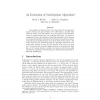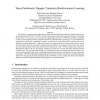976 search results - page 11 / 196 » Evaluating Adversarial Partitions |
VLDB
1991
ACM
14 years 3 days ago
1991
ACM
A non-equijoin of relations R and S is a band join if the join predicate requires values in the join attribute of R to fall within a speci ed band about the values in the join att...
AGENTS
1999
Springer
14 years 27 days ago
1999
Springer
In this paper, we present a novel multi-agent learning paradigm called team-partitioned, opaque-transition reinforcement learning (TPOT-RL). TPOT-RL introduces the concept of usin...
CLUSTER
2002
IEEE
13 years 8 months ago
2002
IEEE
This paper presents the design and evaluation of an adaptive system sensitive partitioning and load balancing framework for distributed adaptive mesh re nement applications on het...
DEXAW
2006
IEEE
14 years 2 months ago
2006
IEEE
The effective grouping, or partitioning, of semistructured data is of fundamental importance when providing support for queries. Partitions allow items within the data set that sh...
MASCOTS
2003
13 years 10 months ago
2003
Scalability is the primary challenge to studying large complex network systems with network emulation. This paper studies topology partitioning, assigning disjoint pieces of the n...


